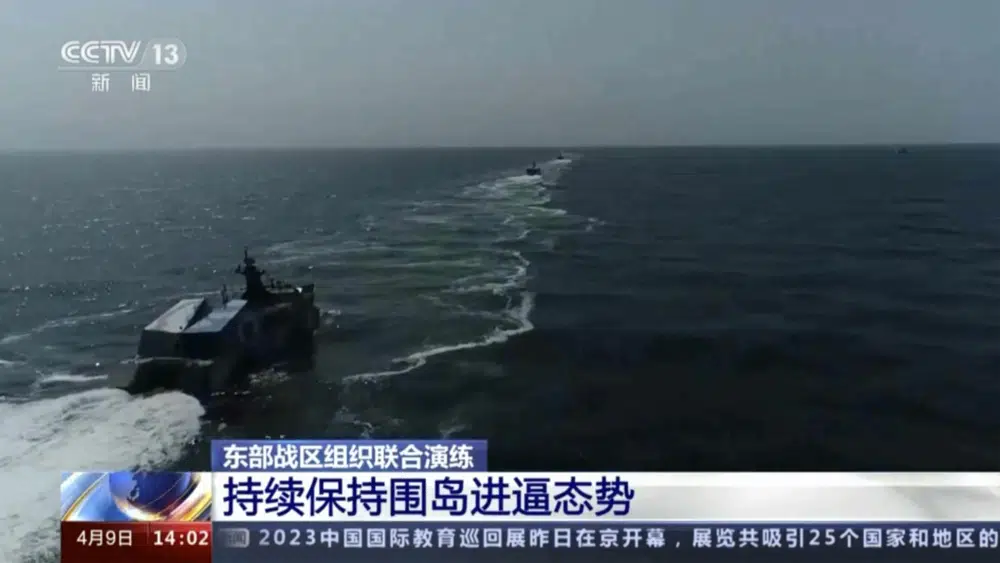China’s military sent several dozen warplanes and warships toward Taiwan in a large-scale exercise that simulated sealing off the island in response to its president’s trip to the U.S.
The Chinese military earlier had announced three-day “combat readiness patrols” which it called Joint Sword, as a warning to Taiwan, a self-ruled island which China claims as its own. Beijing says contact between foreign officials and the island’s democratic government encourages Taiwanese who want formal independence, a step China’s ruling Communist Party says would lead to war.
The sides split in 1949 after a civil war, and the ruling party says the island is obliged to rejoin the mainland, by force if necessary. Military analysts suggest that in the event of a war, China may block sea and air traffic around Taiwan, preventing the United States, Japan or other nations from intervening or sending supplies to help the island defend itself.
China’s latest military actions follow President Tsai Ing-wen’s delicate diplomatic mission to shore up Taiwan’s dwindling alliances in Central America and boost its U.S. support, a trip capped with a sensitive meeting with U.S. House Speaker Kevin McCarthy in California. A U.S. congressional delegation also met with Tsai over the weekend in Taiwan after she returned.
China responded to the McCarthy meeting by imposing a travel ban and financial sanctions against those associated with Tsai’s U.S. trip and with increased military activity through the weekend.
On Monday morning, the Chinese People’s Liberation Army said its Shandong aircraft carrier for the first time was taking part in the exercises encircling Taiwan. It showed a video of a fighter jet taking off the deck of the ship, according to a post from the PLA’s Eastern Command on Weibo, the social media platform.
State broadcaster CCTV, citing the PLA, said the exercises are “simulating the joint sealing off” of Taiwan as well as “waves of simulated strikes” at important targets on the island.
Between 6 a.m. Sunday and 6 a.m. Monday, a total of 70 planes were detected and half crossed the median of the Taiwan Strait, an unofficial boundary once tacitly accepted by both sides, according to Taiwan’s Ministry of National Defense. Among the planes that crossed the median were 8 J-16 fighter jets, 4 J-1 fighters, 8 Su-30 fighters and reconnaissance planes.
Later Monday morning, Taiwan’s defense ministry reported another 59 flights by bombers, as well as multiple fighter jets.
That followed a full day between Friday and Saturday, where eight warships and 71 planes were detected near Taiwan, according to the island’s Defense Ministry. The ministry said in a statement it was approaching the situation from the perspective of “not escalating conflict, and not causing disputes.”
Taiwan said it monitored the Chinese moves through its land-based missile systems, as well as on its own navy vessels.
China’s military harassment of Taiwan has intensified in recent years with planes or ships sent toward the island on a near-daily basis, with the numbers rising in reaction to sensitive activities.
In addition to combat readiness patrols, China’s PLA would hold “live fire training” in Luoyuan Bay in China’s Fujian province opposite Taiwan, the local Maritime Authority announced over the weekend.
Meanwhile, to the south in the South China Sea, the U.S. 7th Fleet said its missile destroyer USS Milius sailed by Mischief Reef in a freedom of navigation operation. China had built an artificial island on the sea feature to stake its claim to the disputed territory.
China said the U.S. “illegally trespassed” into waters near the reef without the permission of the Chinese government, according to a statement from the Chinese military’s southern command.
One of the U.S. representatives who attended the meeting with Tsai last week said Saturday the U.S. must take seriously the threat China posed to Taiwan. Republican Mike Gallagher, chairman of the U.S. House Select Committee on China, told The Associated Press that he plans to lead his committee in working to shore up the island government’s defenses, encouraging Congress to expedite military aid to Taiwan.

